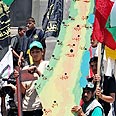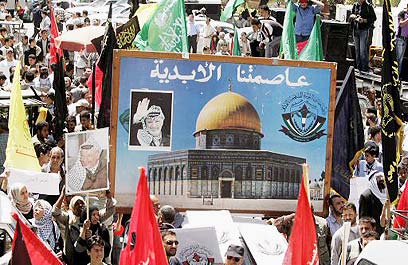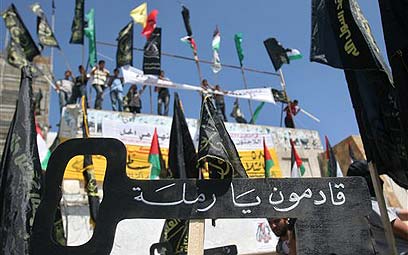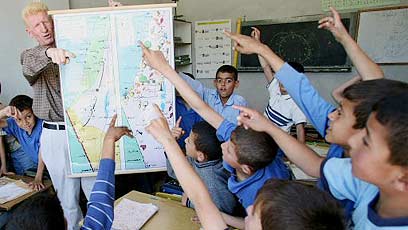
Demonstrating with map
צילום: איי פי
Palestinians: Economic siege – real Nakba
Palestinian Authority marks 'Disaster Day' for State of Israel's establishment. Gaza residents seem worn out, not eager to demonstrate; 'how could people be expected to go out and protest with no salaries?' Fatah activist explains
Gaza residents on Monday marked the 58th Nakba Day – the "disaster" that struck the Palestinian people following the establishment of the State of Israel, which caused millions of Palestinians to become refugees all over the Arab world.
This year, however, the day was different than before and stood in the shadow of what Gazans refer to as "the current Nakba" – the economic and political siege imposed by the world on the Palestinians. Without hope, without livelihood and on the verge of hunger, the demonstrators seemed worn out and unmotivated.
There were those who associated the lack of organization and enthusiasm with the internal crisis and tension between the different organizations, while others ascribed it to the humanitarian crisis: "How can people be expected to go out and protest without salaries? There is no livelihood, and also humanitarian aid barely comes our way," a Fatah activist said.

Nakba Day in Gaza (Photo: Reuters)
The first merchants took their place near the Palestinian Legislative Council at the early hours of the morning to sell drinks and grilled meat to the demonstrators. A weak siren was heard at 11 a.m. and then old loudspeakers began sounding songs supporting Palestine and the right of return. A special meeting was held at the Legislative Council Building to mark the event.
Representatives of the different Palestinian organizations tried to talk using a dying microphone, repeating the clichés about the sanctity of the right of return. Pictures of the al-Aqsa Mosque were placed on top of cars, while pictures of Palestinian villages were raised during the demonstration.
Despite Hamas' rise to power, less pictures of the Palestine map were seen. The Gazans, it seems, have already shelved this idea.

Calling for right of return (Photo: AP)
The owner of a bakery located on a street behind the Legislative Council building said that in the past few weeks he was approached by residents asking to buy dried bread which had been sitting on the shelf for more than a day in order to pay less.
"With one shekel (about 22 cents) you can buy seven pita breads, and sometimes I sell 10 or 15 pita breads left over from the previous day for one shekel. Many times, in spite of my difficult situation, I give the old bread just like that for free," he said.
'No one even dreams about eating meat'
"The situation is a disaster," said 23-year-old Khamed, member of the Palestinian National Security.
Khamed, originally from Rafah, said that since the salaries were frozen he stopped receiving the NIS 800 (about USD 180) he used to bring home every month to provide for family of seven members.
"No one here even dreams about eating meat. Maybe once in three weeks we slaughter a chicken from our little henhouse. Who even thinks about coming to demonstrate in such a situation? Is there a greater nakba than the nakba we are living through these days?" he asked.
Khamed also explained the relatively poor attendance at the demonstration.
"How can a person come from Rafah or Kham Younis to Gaza without any money? A two-way shuttle taxi from Rafah to the square here in Gaza costs NIS 16 (about USD 3.6) and from Khan Younis to Gaza it's NIS 10 (about USD 2.2). Who will come here when he has no money to eat? If people have not one shekel in their pocket, how can they mark the Nakba? The real nakba is that people have no money," he charged.

Children in Hebron study map (Photo: Reuters)
Businesses in Gaza and in the northern Strip remained open despite the Nakba Day, but there was customer traffic and not only because of the Nakba.
In the northern Strip Palestinian security personnel were seen on high alert after several IDF tanks and bulldozers entered the Beit Lahiya and Beit Hanoun areas. The Palestinian police officers explained that the Israelis are looking for mines, but some of them admitted that even if Israel returns to Gaza it's not likely that the situation in the Strip will be any worse.
The officers recounted that they heard Hamas is about to come out with a recognition of Israel "or something of the kind."
"Whether they recognize or not, we are not so interested in it, as long as they bring us our salaries," one of the police officers said while taking cover from the sun under a torn sheet.
The Beit Lahiya children left their school at noon holding pictures and small flags prepared in the classrooms to mark Nakba Day.
"We shall not forget Ashkelon, we shall not forget Yavne and Jaffa," their Palestinian flags read.
The grownups stood on the street, watched the children and nodded in despair, as if trying to say: "These children have yet to understand the situation, and therefore they can afford to shout and sing."










